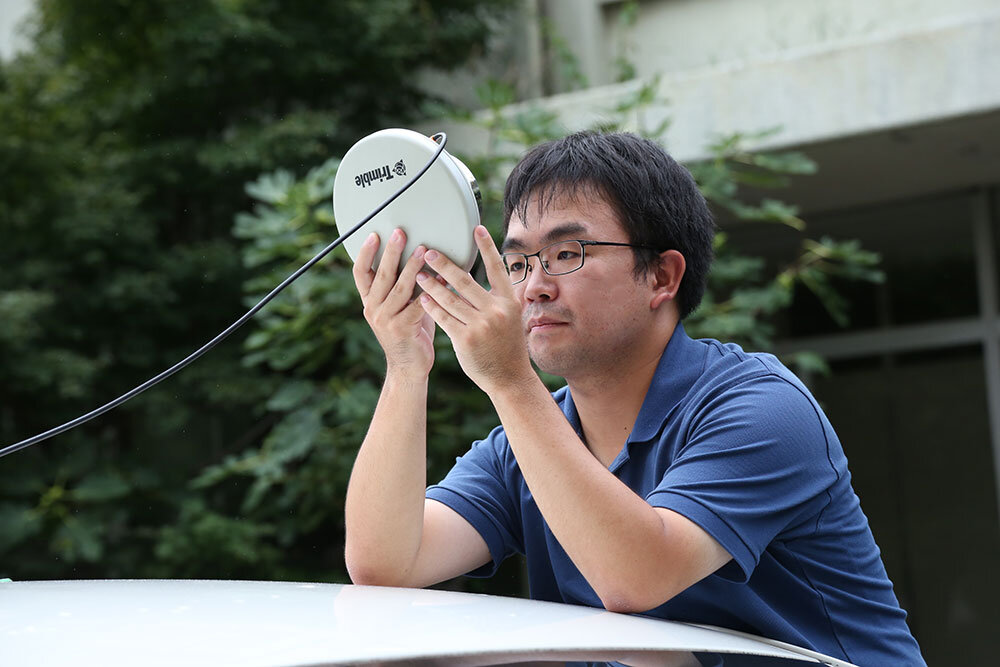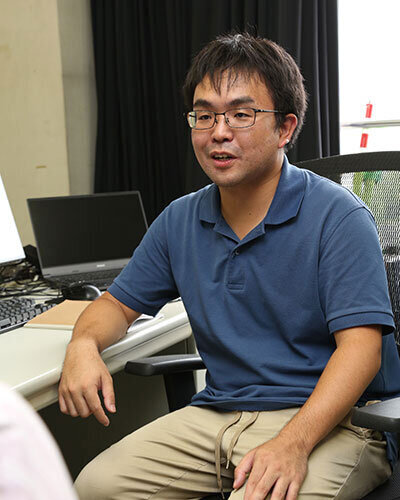INTRODUCTION学生紹介
- HOME
- support
- Student Introduction
- OZEKI TOMOHIRO
STUDENT INTRODUCTION
3rd year of program, 1st year of Course of Applied Marine Environmental Studies, Doctoral Course
OZEKI TOMOHIRO
Specializations:Applied Ocean Engineering
Main academic advisor:KUBO, Nobuaki
Mentor:FUJITA, Mikiko (JAMSTEC)

Experiencing the Joy of Solving Social Problems Every Day, and Cooperating with Companies as One of Only a Handful of GPS Researchers in Japan
Researching how to improve the accuracy of GPS to accurately determine the position of boats traveling on rivers
I have been able to display my location via GPS since before I got a smartphone, but I noticed on old feature phones that they would sometimes display a position that was clearly different from my actual location. Now that I have a smartphone, there is little risk of it showing a completely different location. The reasons that an odd position was sometimes shown boil down to the performance of the device itself, and the diffused reflection of the GPS signal. Because GPS signals are essentially radio waves, they get reflected off buildings and other large surfaces, causing devices to receive distorted signals and interpret the location incorrectly. My research is concerned with reducing the locational discrepancy of GPS, with a focus on the GPS systems of river boats. The rivers in Tokyo are similar to roads, and river boats are faced with the same problems as cars and pedestrians. The theme of my research is how river boats can use more accurate GPS.
GPS research in Japan presents many opportunities for collaborative research with companies and untapped markets
There are not many GPS researchers in Japan. This is because GPS was originally a military technology, and few people in Japan conduct research on military technology and related fields. In addition, while AI research is conducted in the WISE Program, this is another field of research that few people are engaged in. Therefore, I thought that combined research into GPS and AI would be pretty interesting, and a veritable blue ocean in Japan.
Since there are so few researchers of GPS and AI, I have many opportunities to collaborate with companies. Doing collaborative research also gives me the opportunity to travel to various different places. If a problem is occurring in a particular place, I get invited to investigate, and travel to that location to get to the bottom of the problem. GPS is also used for surveying and monitoring at constructions sites, so I also visit construction sites, and I have ridden on the sightseeing boats that cruise Tokyo Bay and the Edogawa River. Being able to visit places where one would not normally be permitted is an interesting part of this kind of research. The Information and Communication Engineering Laboratory to which I belong is offered a particularly large number of opportunities to work with companies. One's horizons expand when one gets to be acquainted with people from various different companies.
On the other hand, though there are benefits of doing research in a field that few Japanese people are involved in, it is not without its issues. One example is the lack of literature in Japanese. Papers on GPS are often written by researchers from economic powerhouses such as the U.S. and China, and so I have to rely on these for information. The issue is that, compared to papers in Japanese, it takes time to read them.
It is not like I had a particularly strong interest in GPS and AI to begin with; I came to research GPS more by chance. When I was a freshman at university, the classroom where I attended one of my lectures happened to be next to the lab where I am today, and I often saw the details of the research posted on the door when I was on my way to lectures. In my third year, I was given a tour of the lab before it was decided that I would join, and I was invited to join at the behest of the professor, which is how I came to be at the lab, researching GPS. Thanks to that, I am able to do collaborative research with companies, and spend in each day in fulfilling way, for which I am very grateful.
The WISE Program leads to many inspiring connections
 The WISE Program began in 2020, just at the time that I was progressing to graduate school. I felt it was the perfect opportunity to join the program, as I would become a member of the inaugural class.
The WISE Program began in 2020, just at the time that I was progressing to graduate school. I felt it was the perfect opportunity to join the program, as I would become a member of the inaugural class.
So, although I joined the WISE Program for an almost trivial reason, I feel a great many benefits from having joined. For example, university laboratories tend to be quite small, closed-off communities. Researchers who continue all the way through to obtaining a PhD end up in the same place for six years unless they do an internship somewhere. However, participation in the WISE Program means that you also have a base location outside of the university, and you get to meet people that you would not meet at university. This serves to inspire one and blow fresh wind into one's sails. Being able to connect with so many people is a huge advantage.
I want to continue for as long as the field of GPS research exists in Japan
Social issues are becoming important themes in collaborative research with companies, and are becoming the main focus of my own research activities. Since I am working to solve social problems, I believe it is safe to say that my research has already been implemented in society. It is my intention to obtain a doctorate in GPS research, so I would like to continue contributing to society in this field. As part of Japan's national policy, it has been decided that the country will operate its own GPS satellite, named "Michibiki," which will be in orbit by 2030. Therefore, I think the field of GPS research will not disappear before then. As long as there is GPS in Japan, I would like to continue my research for as long as possible.

